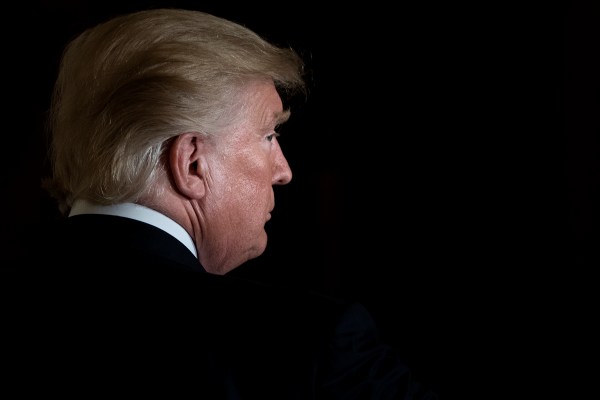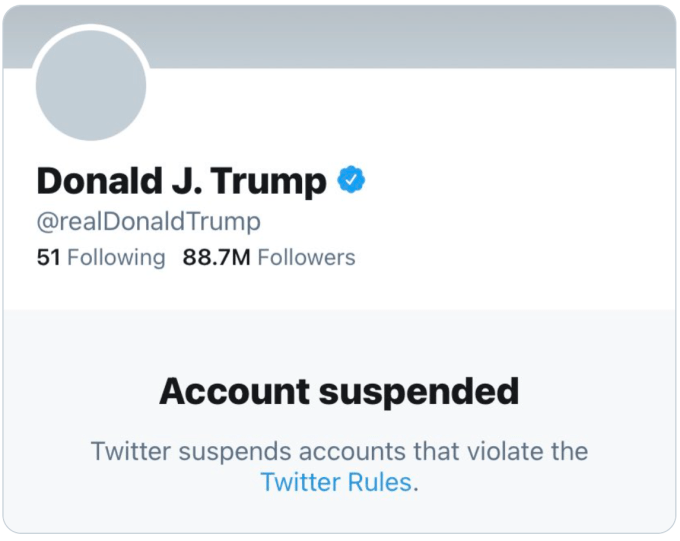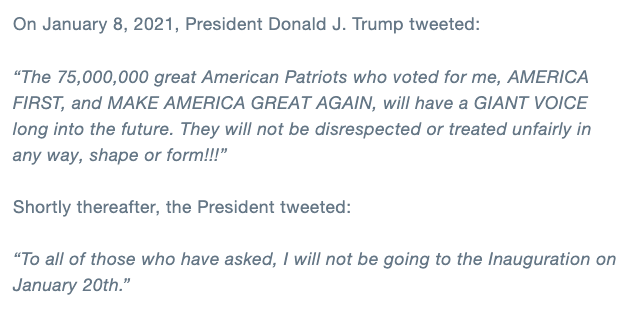
Twitter permanently removed the president of the United States from its platform Friday, citing concerns over the “risk of further incitement of violence” and Trump’s previous transgressions.
“In the context of horrific events this week, we made it clear on Wednesday that additional violations of the Twitter Rules would potentially result in this very course of action,” Twitter wrote. “… We made it clear going back years that these accounts are not above our rules and cannot use Twitter to incite violence.”
Trump will not be able to get around Twitter’s ban by making a new account or using an alias, a Twitter spokesperson clarified to TechCrunch. If the president attempts to evade his suspension, any account he uses will also be subject to a ban for breaking Twitter’s rules.
Update: Trump appeared to do just that Friday night, popping up on @POTUS. “We will not be SILENCED! Twitter is not about FREE SPEECH,” Trump tweeted through that account, indicating that his team might build his own platform in the “near future.”

Twitter emphasized that it made the threat of an impending ban clear and called this week’s events “horrific.” While Trump has previously broken the platform’s rules, the company’s maintained his account under its special guidance for world leaders and information in the public interest.
In an in-depth breakdown, Twitter published the assessments of Trump’s tweets that led to his suspension. Two of his tweets on Thursday appear to have pushed the account over the edge, and Twitter interpreted them as potentially inciting violence in the context of the week’s events.

On Wednesday, Twitter suspended President Trump’s account until he deleted three tweets that the company flagged as violating its rules. Trump’s account was set to reactivate 12 hours after those deletions, and he returned to the platform on Thursday night with a video in which he appeared to concede his election loss for the first time.
Trump crossed a line with Twitter when he failed to condemn a group of his supporters who staged a violent riot at the Capitol building while Congress met to certify the election results. In one tweet, Trump shared a video in which he gently encouraged the group to return home, while reassuring his agitated followers that he loved them and that they were “special.”
At that time, Twitter said that Trump’s tweets contained “repeated and severe violations” of its policy on civic integrity and threatened that any future violations would result in “permanent suspension” of the president’s account.
Wednesday, January 6:
- 1 PM ET: Trump wraps up a rally near the White House protesting the legitimate election results. During the event he urges attendees to march toward Congress.
- 2:15 PM: Trump supporters breach the interior of the Capitol building.
- 4:15 PM: Trump tweets a video gently telling rioters that they need to go home and “we love you.”
- 5 PM: Twitter places a large warning label on the video.
- 6 PM: Trump tweets again, failing to denounce the violence and urging his supporters to “Remember this day forever!”
- 7 PM: Twitter locks Trump out his account until he deletes three tweets and waits for a 12-hour period.
Thursday, January 7:
Friday, January 8:
- 9:45 AM: Trump tweets again with a less conciliatory tone, declaring that anyone who voted for him will “not be treated unfairly in any way, shape or form!!!”
- 10:45 AM: Trump tweets that he will not attend President-elect Joe Biden’s inauguration.
- 6:20 PM: Twitter announces that @realDonaldTrump is suspended permanently.
While Facebook initially took more drastic action against Trump’s account in the aftermath of Wednesday’s chaotic siege on Capitol Hill, Twitter has a longer history of friction with the outgoing president. In early 2020, Twitter’s decision to add a contextual label to a Trump tweet calling mail-in voting “fraudulent” prompted the president to craft a retaliatory though largely toothless executive order targeting social media companies.
Trump held the same grudge through the end of the year, trying to push a doomed repeal of Section 230 of the Communications Decency Act — the law that protects online companies from liability for user-generated content — through Congress in increasingly unusual ways.
Twitter’s move Friday to suspend the sitting U.S. president from its platform is a historic decision — and one the company avoided making for the last four years. In the wake of Wednesday’s insurrectionist violence, and Trump’s role in inciting it, tech’s biggest social networks appear to have at last had enough.
But as with election conspiracies, dangerous COVID-19 misinformation and the camo-clad extremists who attacked the Capitol this week, it’s too late to undo the chaos that real-time Trump unleashed over the last four years, 280 characters at a time.

Recent Comments